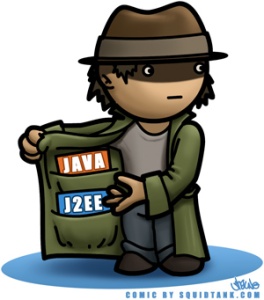Java Isn't The Problem

Quite a few people recently have been blaming Java for part of the downfall in current computer science (CS) graduates. While I don’t particularly like java, I’d like to go to its defence to say that teaching Java is not the real reason that a lot of CS graduates are no good these days. I know this is a touchy subject for some people so I apologise in advance if I’ve offended anyone.
It’s not about Language
To jump straight into it, the first language that students learn doesn’t have a lot to do with how good they will end up. Most of the “core languages” (Java, C#, C/C++, VB.NET etc) that you see being taught at universities allow the teaching of the core programming principles:
- Low Level – sequence, conditions and loops
- Mid level – functions, objects and recursion
- Hi Level – Modular design, design patterns, API creation
- High level optimizations – orders of complexity and algorithmic optimization
These principles cover a large amount of “learning to program” and you can teach all of them in any of the languages listed above. So what things are missing from some of these languages (particularly, Java)?
- Pointers
- Low level optimizations
- How operations map down to machine code
The important point here is that these are a small subset of the skills required to program and they don’t require the first language that is taught to students to be C/C++ (or equivalent). Teaching these languages early on is definitely required; however they can easily fit outside the scope of the core introduction courses. The extra bonus from not teaching C/C++ as the first language is that it forces students to learn at least two languages during their first steps into programming and this is a good thing.
So what is the problem with CS graduates?
1. Lack of Passion
Basically it comes down to the fact that lecturers aren’t getting students passionate about programming. One of the key qualities I look for in a great programmer is their love for programming. I’ve found that the best way to get passionate about something is for someone to pass their passion on to you. The best way of doing this is through teaching. I had this very problem while at university and thankfully during my course I did some Microsoft training where our teacher’s passion was passed on to me.
It seems that lecturers are confusing fun with enjoyment/passion. Something doesn’t need to be fun for people to be passionate about it and trying to make courses “more fun” and less boring is not the right approach. The ability to create something has an almost primal feeling of enjoyment and power. Lecturers need to tap into this and get students excited and passionate about what they are creating even if it is hard work.
2. Lack of algorithms and Mathematics
One area that could easily be seen as boring is algorithms and mathematics. If not taught correctly this can certainly be true. However these are a core part of learning to program. The fact that they are language independent proves that Java is not to blame, and that they are more important than mere language choice. With a solid understanding of algorithms and mathematics, programmers can write good code in almost any language.
If algorithms and mathematics are being dropped because lecturers think they are too boring, they need to find someone that can make them exciting! To give an example, I was taught matrix math both at high school and at university. At high school I understood it straight away and had no issues with its use. At university we spent just as long learning it, however it was so convoluted that it almost confused me into forgetting what I had initially learnt. The way in which it was taught was both dry and boring, but also counter-intuitive to the average student that doesn’t have a PHD in mathematics. Any subject matter can be boring if taught badly, lecturers need to stop blaming the content and start looking at their teaching styles.
Conclusion
So the problem at the moment isn’t java but instead the courses and those creating them. I don’t think it matters what language you teach. Without creating passion, teaching core algorithms and mathematics students are never going to be good programmers.
 I build software. The best place to find me is on
I build software. The best place to find me is on